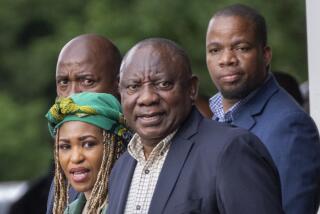SOUTH AFRICA : Beloved, Hated, Frail Old Man Leads ANC in Natal : Harry Gwala directs the years-long guerrilla war against the supporters of Inkatha.
PIETERMARITZBURG, South Africa — In the killing fields of Natal province, one of the most feared men is a paunchy, partially paralyzed 72-year-old with brown spectacles and a graying goatee who can’t lift a telephone, much less a gun.
He is Harry Gwala, spiritual leader of the thousands of angry young African National Congress comrades engaged in a bitter, tit-for-tat guerrilla war here with supporters of the Inkatha Freedom Party.
That long war, which has claimed 6,000 Zulu lives in Natal since 1985, has escalated again with more than 60 new killings in just two weeks. As usual, most of the victims were innocent civilians. But also among the dead was Gwala’s deputy, Reggie Hadebe, ambushed while returning from a peace meeting with Inkatha.
The renewed strife between Nelson Mandela’s ANC and Mangosuthu Gatsha Buthelezi’s Inkatha has posed a serious threat to constitutional talks aimed at giving the black majority a vote. And it has been a reminder that this province of green mountains and sugar cane fields, poetically described by the late Alan Paton in “Cry, the Beloved Country,” remains the central obstacle to a peaceful future in South Africa.
Political tolerance is an unknown concept in the predominantly Zulu province, where gunfire has supplanted talk. The ANC contends that Buthelezi, with government help, is trying to rid the province of ANC supporters. Inkatha contends that it is Gwala and the ANC that are engaged in violent “political cleansing.”
Themba Harry Gwala, a hard-line Stalinist and 21-year veteran of the Robben Island penal colony, is beloved by the ANC youth of Natal. And even though his arms are paralyzed by a mysterious nervous system disorder and his health is failing, Inkatha regards the regional ANC leader as a threat.
“He’s a dangerous man, a very dangerous man,” said Ed Tillet, an Inkatha spokesman in Durban. “He is a warlord, at the nerve center of the ANC’s military operations in Natal.”
But, Tillet admitted, “We haven’t been able to pin any particular crime on him. He covers his tracks very well.”
The object of those allegations is unrepentant. Gwala declares that Inkatha is being used by the white-minority government to gain political superiority over the ANC.
“We are not passive,” Gwala said. “We are organizing to destroy apartheid. Inkatha is defending the vestiges of apartheid.”
Such remarks have gotten Gwala into hot water in recent months. The National Peace Secretariat, a largely ineffectual body set up a year ago to halt the killing, recently reprimanded him for his fiery rhetoric.
His offending remark: “When the (Inkatha) warlords come to kill us, we will kill them. We will not meet them with Bibles in our hands.” He refuses to retract those words.
Harry Gwala is the embodiment of ANC anger in Natal and he, even more than ANC President Mandela, is Inkatha’s nemesis. At Shell House, the ANC headquarters in Johannesburg, Gwala is respected but also regarded as something of a loose cannon.
Gwala, who grew up in this region, has been a member of the ANC since 1944 and currently is on the policy-making bodies of both the Communist Party and the ANC. He spent eight years in prison in the 1960s after being convicted of sabotage and was sentenced to life in prison in 1976 for “furthering the aims” of the ANC.
Gwala was released in 1988 on humanitarian grounds. But six months later he led a funeral procession for a local labor leader and was severely whipped by police.
He exchanged letters with Buthelezi in an attempt to end the Natal fighting, but their correspondence ended when Gwala suggested that the thin-skinned Inkatha leader’s preoccupation with ANC “insults” was fanning the violence.
These days, Gwala, hated and feared by Inkatha, is guarded around the clock by ANC soldiers. But he says he is not worried about his safety.
“We are at war, a war of liberation,” Gwala said. “And we’re going to be killed one day.”
More to Read
Sign up for Essential California
The most important California stories and recommendations in your inbox every morning.
You may occasionally receive promotional content from the Los Angeles Times.











